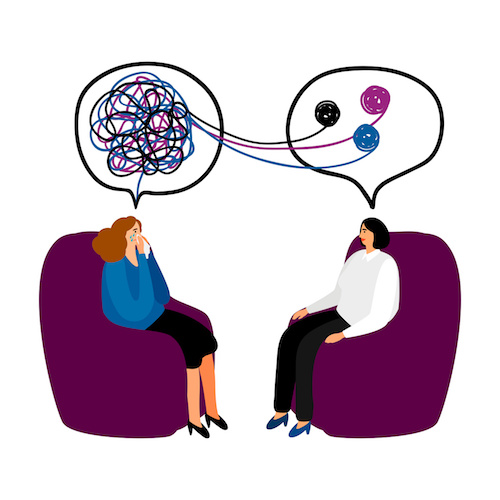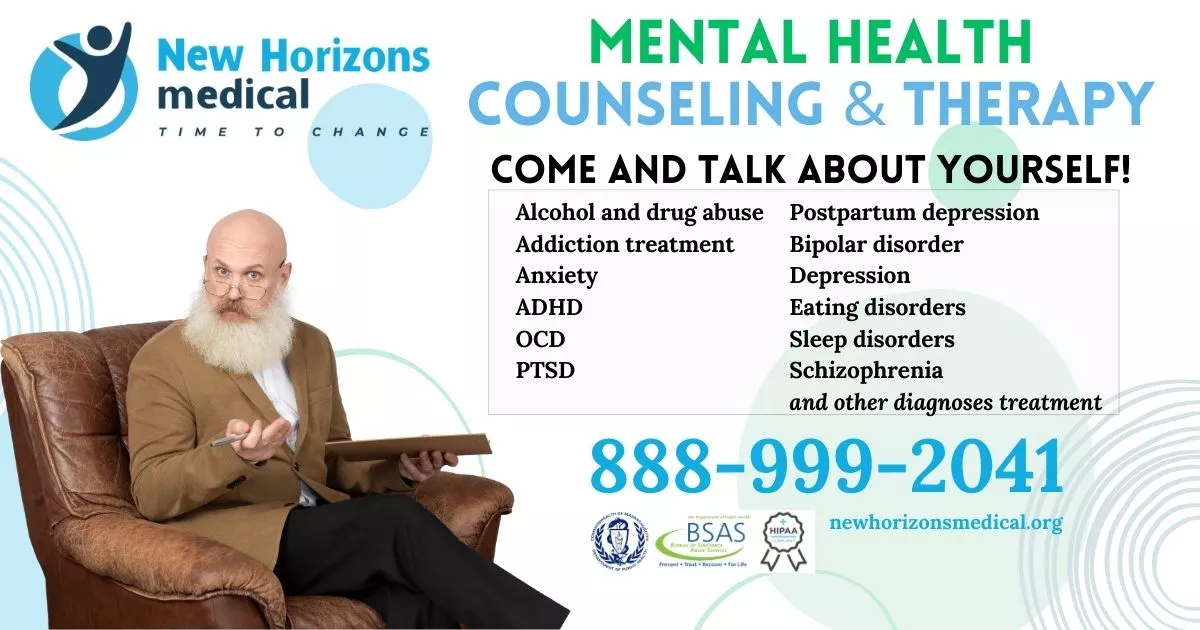Top 10 Reasons to Try Couples Therapy for a Stronger Emotional Connection
Wiki Article
Unlocking the Secrets of Mental Health And Wellness: A Review of Therapy and Treatment Options
Mental wellness is a facility and vital facet of general wellness. Numerous therapy and treatment options exist to address various emotional challenges. Each approach supplies special benefits and methods customized to specific requirements. Recognizing these options is necessary for any person looking for to enhance their mental wellness. Marriage Counselling. What variables should one think about when exploring these opportunities? The response may disclose a path to a much healthier emotionRecognizing Mental Health and Its Relevance
Mental health includes the psychological, mental, and social health of individuals, substantially influencing how they believe, really feel, and act. Its relevance can not be overstated, as it impacts every facet of life, including partnerships, job performance, and general lifestyle. People with good psychological health have a tendency to deal with stress much more effectively, preserve healthier connections, and make informed decisions. On the other hand, inadequate psychological wellness can cause psychological distress, damaged functioning, and numerous psychological problems, which may call for professional intervention. Comprehending psychological health and wellness is important for acknowledging the indications of distress and the requirement for support. Awareness also promotes empathy and lowers preconception, motivating people to seek help when needed. By prioritizing psychological wellness, areas can cultivate settings that sustain psychological health, inevitably bring about healthier, more resistant individuals. This structure works as an important step toward efficient mental health and wellness counseling and treatment options.
Kinds Of Therapy Techniques
Counseling techniques vary widely, each customized to fulfill the unique demands of individuals looking for assistance. Among the most usual types are cognitive-behavioral therapy (CBT), which concentrates on recognizing and altering unfavorable thought patterns, and person-centered therapy, which emphasizes empathy and approval. Psychodynamic treatment discovers past experiences and unconscious processes to understand present behavior, while solution-focused short therapy intends to identify services instead of examine problems.Additionally, family members treatment addresses relational characteristics and communication within family members, fostering healthier communications. Group counseling provides a communal room for participants to share experiences and support one another. Other methods consist of existential therapy, which motivates people to discover definition and purpose, and art or music treatment, which uses creative expression as a restorative device. Each method provides distinctive strategies and approaches, permitting clients to locate the most suitable approach for their individual development and healing trips.Checking Out Different Therapy Modalities
In the domain of psychological health therapy, different treatment methods provide unique methods to treatment. Cognitive Behavioral Treatment emphasizes the link in between ideas and actions, while Psychodynamic Treatment explores unconscious influences on psychological health. In Addition, Mindfulness-Based Strategies advertise present-moment awareness as a way to boost psychological regulation and general mental health and wellness.Cognitive Behavior Modification
Cognitive Behavior Modification (CBT) stands out as one of one of the most widely practiced and investigated modalities in mental wellness therapy. This strategy concentrates on the affiliation between sensations, thoughts, and actions, highlighting that modifying negative idea patterns can result in improved emotional wellness and behavioral adjustments. CBT is structured, commonly including a minimal number of sessions, and aims to gear up people with practical abilities to handle their symptoms. It is reliable for a variety of problems, consisting of stress and anxiety disorders, anxiety, and trauma. By making use of methods such as cognitive restructuring and exposure therapy, CBT cultivates strength and encourages clients to challenge challenges head-on, making it a beneficial alternative in the landscape of psychological health therapies.Psychodynamic Treatment Methods
Psychodynamic treatment strategies offer a deep exploration of the unconscious mind and its impact on behavior and psychological well-being. Rooted in Freudian theory, these techniques stress the value of very early youth experiences and subconscious problems. Via methods such as cost-free association, desire evaluation, and transference, individuals acquire insight right into their feelings and thoughts, cultivating self-awareness and understanding. This therapeutic method urges clients to uncover quelched feelings and unsettled issues, which can be crucial in dealing with current emotional difficulties. By analyzing the interaction between past experiences and present habits, psychodynamic therapy aims to promote psychological recovery and individual growth. Eventually, it gives a structure for people to discover complex internal characteristics that affect their psychological health.
Mindfulness-Based Strategies
While conventional treatments frequently focus on previous experiences, mindfulness-based strategies focus on present-moment understanding as a path to emotional wellness. These approaches, consisting of mindfulness-based cognitive therapy (MBCT) and mindfulness-based tension decrease (MBSR), urge individuals to involve totally with their ideas and feelings without judgment. Experts discover to observe their psychological states, promoting a higher understanding of psychological triggers and responses. This practice not just relieves symptoms of stress and anxiety and clinical depression yet also enhances overall mental resilience. By incorporating mindfulness workouts, such as reflection and deep breathing, clients cultivate a sense of tranquility and quality. Eventually, mindfulness-based techniques equip people to navigate life's difficulties with increased recognition and approval, promoting a healthier partnership with their thoughts and feelings.The Role of a Therapist or Counselor
A skilled therapist or therapist plays a crucial function in supporting people with their mental health trips. They give a risk-free, non-judgmental space where customers can express their ideas and feelings honestly. Cognitive Behavioural Therapy. By utilizing different therapeutic strategies tailored to each individual's needs, specialists help customers discover underlying problems that may add to their mental health challenges.Therapists supply support and devices to manage tension, anxiety, anxiety, and various other emotional difficulties. Their training outfits them to acknowledge patterns in actions and believed procedures, promoting insights that cause individual development. They additionally cultivate a strong therapeutic alliance, which is crucial for successful outcomes.Moreover, specialists remain dedicated to discretion and ethical standards, ensuring a trusting atmosphere. Inevitably, the role of a specialist or therapist is to encourage individuals, motivating them to create resilience and healthier coping methods while guiding via life's complexitiesExactly how to Pick the Right Therapy or Treatment Choice
Selecting the appropriate counseling or therapy alternative starts with evaluating specific needs. It is important to comprehend individual difficulties and goals prior to exploring various therapy designs. This foundational action can substantially influence the effectiveness of the selected method.Examine Your Requirements
Exactly how can individuals efficiently assess their psychological health requires when evaluating therapy or treatment options? They should show on their psychological state and identify particular concerns, such as anxiousness, depression, or connection challenges. Journaling can be a valuable tool for tracking thoughts and feelings over time. Furthermore, people might profit from looking for responses from trusted friends or relative relating to viewed adjustments in behavior or state of mind. It is likewise handy to evaluate personal objectives for therapy, such as enhancing coping abilities or gaining understanding into personal patterns. Researching various therapy modalities and their suitability for details demands can assist in making an informed choice. Cognitive Behavioural Therapy Ultimately, self-awareness plays a critical duty in picking the appropriate course for mental health assistance.
Check Out Therapy Designs
While going across the diverse landscape of treatment options, individuals must consider different designs of counseling to find the ideal suitable for their special demands. Cognitive Behavioral Therapy (CBT) concentrates on transforming negative thought patterns, while Psychodynamic Treatment discovers subconscious processes and previous experiences. Humanistic techniques stress individual development and self-actualization, promoting a helpful atmosphere. In addition, mindfulness-based treatments grow present-moment recognition, aiding emotional policy. For those seeking structure, Solution-Focused Quick Therapy targets particular objectives and remedies. Team therapy offers a public setup for common experiences and assistance. Ultimately, people should certainly reflect on their preferences, comfort levels, and certain difficulties, ensuring they pick a therapeutic style that reverberates with their personal journey toward mental well-being.Getting Over Obstacles to Seeking Aid

The Advantages of Counseling and Treatment for Mental Health
Looking for assistance for mental health challenges can result in considerable enhancements in total wellness. Counseling and therapy supply individuals with a risk-free room to explore their ideas and feelings, promoting self-awareness and personal development. These professional services outfit clients with coping techniques and analytic skills tailored to their one-of-a-kind situations.Moreover, treatment can reduce symptoms of anxiousness, depression, and other mental wellness disorders, enhancing psychological strength. Routine sessions advertise liability and urge people to set and attain personal goals. Through different therapeutic techniques, such as cognitive-behavioral treatment or mindfulness techniques, customers find out to reframe unfavorable ideas and develop healthier behaviors.Additionally, the restorative connection itself can be a source of assistance, aiding to battle seclusion and isolation. Overall, engaging in counseling and therapy is an aggressive action towards attaining psychological health, allowing people to lead more satisfying lives.Often Asked Concerns
Just How Long Does Therapy or Treatment Typically Last?
The period of therapy or treatment differs substantially, usually lasting from a few sessions to a number of months or years. Aspects influencing this include the person's specific needs, the sort of treatment, and healing goals.What Should I Expect During My Initial Session?
Throughout the very first session, individuals can anticipate an intro, discussion of concerns, and the specialist's technique. They may finish assessments and establish goals, cultivating a secure setting for open communication and structure relationship.
Are There Any Type Of Dangers Related To Therapy?
Therapy can entail threats, such as psychological pain, susceptability, or facing painful memories. While these obstacles might arise, they can also lead to individual growth and healing, making the healing process complex yet potentially satisfying.Just How Can I Inform if My Specialist Is a Great Fit?
Identifying if a therapist is a great fit includes examining convenience, communication style, and restorative method. Favorable relationship and progress towards goals are indicators of an ideal suit, essential for reliable psychological health support.Will My Insurance Cover Therapy or Therapy Procedure?
Determining insurance coverage for counseling or therapy sessions typically requires speaking to the insurance copyright directly. Plans vary significantly, so individuals should confirm benefits, co-pays, and any type of needed pre-approvals before going after therapy services. Amongst the most typical types are cognitive-behavioral treatment (CBT), which concentrates on recognizing and changing unfavorable idea patterns, and person-centered therapy, which stresses empathy and approval. Psychodynamic treatment explores previous experiences and subconscious procedures to recognize current behavior, while solution-focused brief therapy aims to determine remedies instead than check out problems.Additionally, family members therapy addresses relational dynamics and communication within family members, promoting much healthier interactions. Other strategies consist of existential treatment, which encourages people to discover meaning and objective, and art or music therapy, which makes use of innovative expression as a therapeutic device. Cognitive Behavior Therapy emphasizes the connection between ideas and behaviors, while Psychodynamic Treatment discovers subconscious influences on psychological wellness. Cognitive Behavioral Therapy (CBT) concentrates on changing adverse thought patterns, while Psychodynamic Therapy explores unconscious procedures and previous experiences.Report this wiki page